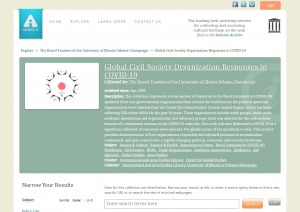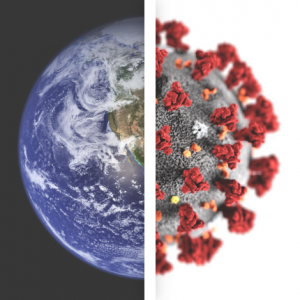Written in collaboration with Steve Witt.
One doesn’t need to look far to see how much the COVID-19 pandemic has impacted the world, halting the mobility of people and goods that we took for granted as critical components of the global economy. This crisis has put a strain on nearly every system of our global society, impacting every sector of civil society. To attempt to preserve some of the initial reactions and concerns brought about the health emergency, the Center for Global Studies and the International and Area Studies Library began archiving websites of civil society organizations around the world as they respond to this crisis.
 The archive began in late April on Archive-It, a platform that enables us to capture virtual “screenshots” of online websites and documents as they existed at the time of capture. To identify content to capture, we first analyzed a random sampling of 1,000 of the nearly 5,000 organizational websites that are included in the Global Studies custom search engine. The search engine comprises a group of mainly non-governmental organizations that work within different Global Studies domains and range from major think tanks to regional organizations and trade groups, covering topics from human rights to food security to migration to arms control. Of these initial 1,000 sites, we identified 350 organizations that either have a sub-site dedicated to COVID-19 (213) or a significant number of reports and articles available through the site’s search (114). In addition, more than a few organizations had already produced substantial reports on the impact of the crisis. Working with subject specialists in the International and Area Studies Library, we’ve added further sites from East Europe, Eurasia, and Africa, attempting to include representation from organizations in multiple regions and publications in multiple language groups.
The archive began in late April on Archive-It, a platform that enables us to capture virtual “screenshots” of online websites and documents as they existed at the time of capture. To identify content to capture, we first analyzed a random sampling of 1,000 of the nearly 5,000 organizational websites that are included in the Global Studies custom search engine. The search engine comprises a group of mainly non-governmental organizations that work within different Global Studies domains and range from major think tanks to regional organizations and trade groups, covering topics from human rights to food security to migration to arms control. Of these initial 1,000 sites, we identified 350 organizations that either have a sub-site dedicated to COVID-19 (213) or a significant number of reports and articles available through the site’s search (114). In addition, more than a few organizations had already produced substantial reports on the impact of the crisis. Working with subject specialists in the International and Area Studies Library, we’ve added further sites from East Europe, Eurasia, and Africa, attempting to include representation from organizations in multiple regions and publications in multiple language groups.
This collection of websites, blog posts, Twitter updates, and reports shows how humanity’s concern and intellectual focus shifted in a mere three months towards the threat and effects of COVID-19 and the cascading and overlapping impacts it has on every human and human system. The global nature of the pandemic is clear. This archive provides documentation of how organizations responded and adjusted positions to accommodate, understand, and gain control over a rapidly changing political, economic, and security landscape. In addition, it shows troubling trends beyond the health threat posed by the virus. Themes across continents emerge of new threats to food security, the proliferation of fake news, fears of a loss of privacy, and populist governments using the crisis to consolidate power and implement policies that further alienate and harm vulnerable and marginalized people. Although the archive is still growing and developing as new sites are added and integrated, it is currently searchable at https://archive-it.org/collections/14004.
 Our archival collection is part of a broader movement by libraries to virtually document the broader impacts of the COVID-19 pandemic. Cornell University Library has developed an archive on the international labor challenges imposed by COVID-19, with webpage captures archiving the responses of unions, employers, governments, and non-profits. The University of Dayton Libraries is collecting webpages documenting the response of the Roman Catholic Church in the United States. The National Library of Medicine has integrated COVID-19 content into its selective Global Health Events web archive, which already included websites captured during the Ebola and Zika virus outbreaks of the last decade. The International Internet Preservation Consortium is amassing a large collection of archived web content that prioritizes the origins of the virus and its spread, regional and local containment efforts, and the wide societal impact felt by the pandemic.
Our archival collection is part of a broader movement by libraries to virtually document the broader impacts of the COVID-19 pandemic. Cornell University Library has developed an archive on the international labor challenges imposed by COVID-19, with webpage captures archiving the responses of unions, employers, governments, and non-profits. The University of Dayton Libraries is collecting webpages documenting the response of the Roman Catholic Church in the United States. The National Library of Medicine has integrated COVID-19 content into its selective Global Health Events web archive, which already included websites captured during the Ebola and Zika virus outbreaks of the last decade. The International Internet Preservation Consortium is amassing a large collection of archived web content that prioritizes the origins of the virus and its spread, regional and local containment efforts, and the wide societal impact felt by the pandemic.
Documentation of the pandemic’s broader effects is complemented by a plethora of projects capturing COVID-19’s impact at the local and individual levels. Public libraries and academic libraries are both at the forefront of these efforts, as Library Journal discussed in an April article. The International Federation of Library Associations and Institutions (IFLA) is also gathering a large collection of case studies that document the ways in which libraries have responded to the virus. Here at the University of Illinois at Urbana-Champaign, the University Archives is collecting personal stories from members of the campus community about their unique personal experiences. On the Archive-It platform, robust efforts to capture websites documenting the impact of COVID-19 at a local level include Dalhousie University Library’s COVID-19 Nova Scotia Web Archive and Kansas City Public Library’s COVID-19 Outbreak web archive.
As we continue to develop our web archive of civil society websites from around the world, we hope to help add a globalized dimension to the current efforts to document the ongoing effects of the COVID-19 pandemic as its impact continues and changes. We hope the archive will be useful to students and researchers seeking to understand this moment in human history and attempting to make sense of how the pandemic impacted different sectors of society and peoples around the world. Because people across the world are dealing with an event of drastic proportions, we feel a responsibility to help capture this pivotal moment in time for future posterity.

Comments are closed.